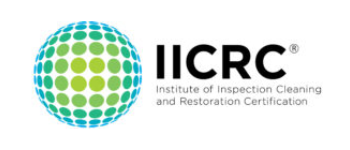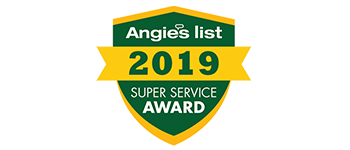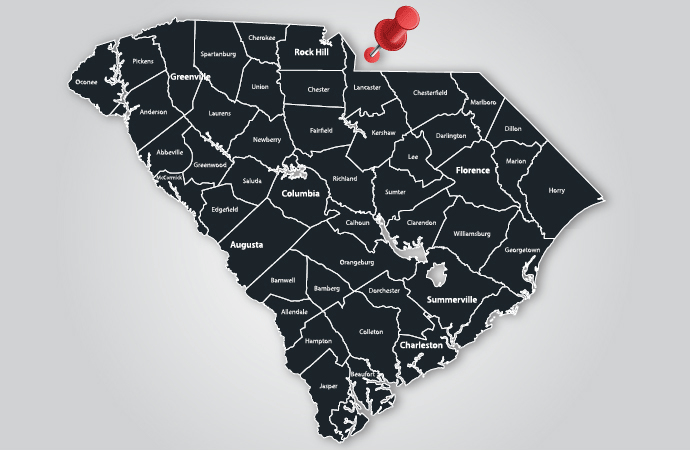Kingsley Water Damage & Fire Cleanup Commercial Mold Damage Article
Mold in commercial buildings poses significant risks to both property and occupant health. Understanding these risks and knowing how to address them properly is crucial for business owners and property managers.
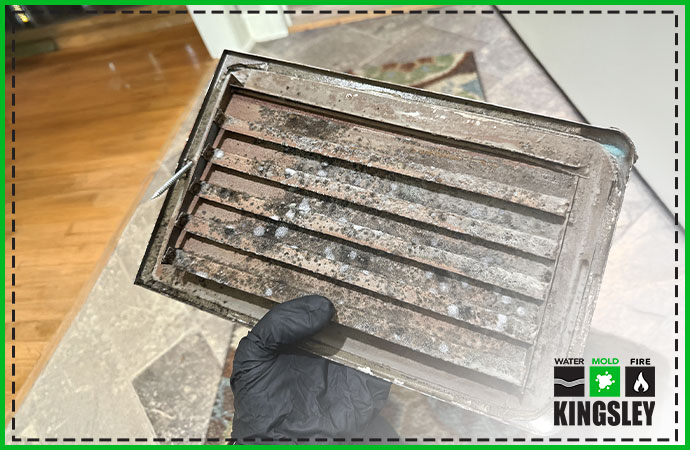
Understanding Commercial Mold Growth
Mold thrives in environments with:
- Moisture levels above 60% humidity
- Temperatures between 40-100°F (4-38°C)
- Organic materials (wood, paper, carpet, drywall)
- Limited airflow
- Lack of Lighting
- HVAC systems and ductwork
- Ceiling tiles and walls
- Under flooring and carpets
- Around plumbing fixtures
- Basement and crawl spaces
- Window frames and sills
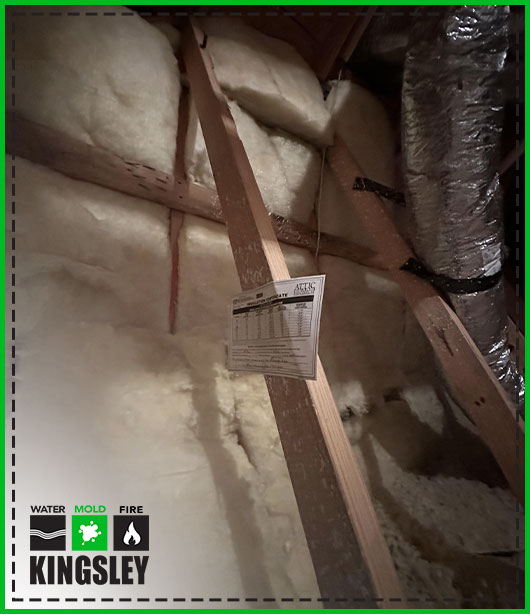
Health and Business Impacts
Mold exposure can cause various health issues:
- Respiratory problems
- Allergic reactions
- Eye and skin irritation
- Headaches
- Chronic fatigue
- Aggravation of asthma symptoms
Untreated mold can lead to:
- Property damage and deterioration
- Decreased property value
- Loss of tenant satisfaction
- Potential legal liability
- Business interruption
- Damage to company reputation

Professional Mold Testing
DIY testing kits often provide incomplete or misleading results. Professional mold testing through Kingsley offers:
- Accurate identification of mold species
- Determination of contamination extent
- Air quality analysis
- Hidden moisture source detection
- Documentation for insurance claims
Kingsley's professional mold testing typically involves:
- Visual inspection
- Air sampling
- Surface sampling
- Bulk material sampling
- Moisture mapping
- Laboratory analysis
Kingsley's Mold Remediation Processes
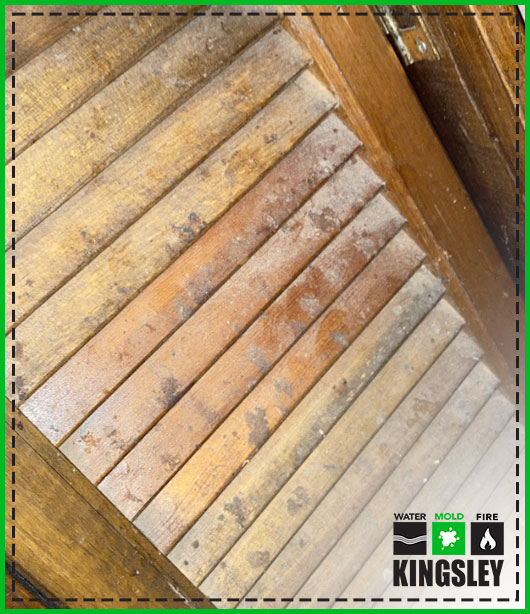
- Comprehensive property inspection
- Moisture source identification
- Damage extent evaluation
- Development of remediation plan
- Documentation for insurance
- Installation of physical barriers
- Negative air pressure establishment
- HEPA air filtration setup
- Protection of unaffected areas
- Personal protective equipment use
- Removal of contaminated materials
- HEPA vacuuming
- Antimicrobial treatment
- Cleaning of salvageable items
- Disposal of contaminated materials
- Moisture source correction
- Ventilation improvement
- Waterproofing
- Regular maintenance scheduling
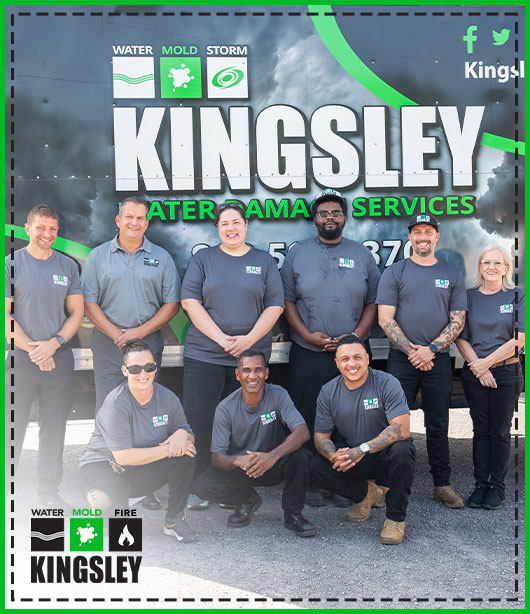
Choosing a Mold Remediation Company
- Industry certifications (IICRC, NADCA)
- Extensive experience
- Comprehensive insurance coverage
- Written mold protocols and specific procedures
- Professional equipment
- Detailed documentation practices
- Verified Testing
- Containment procedures
- Clean-up protocols
- Insurance coverage
- Warranty offerings
- Post-remediation testing
- Prevention recommendations
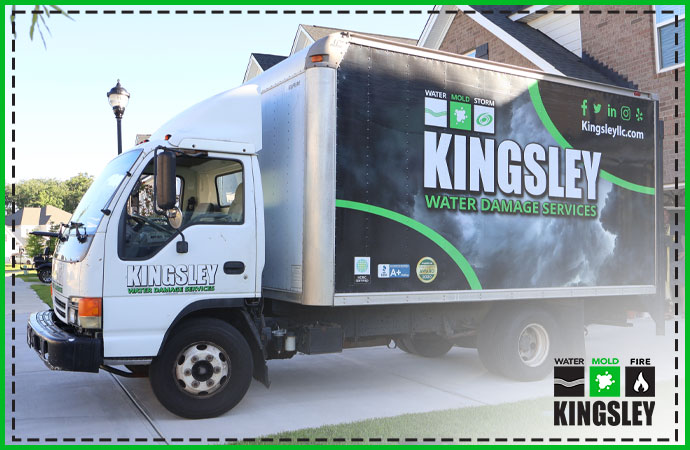
Preventing Future Mold Issues
- Regular building inspections
- Prompt leak repairs
- Proper ventilation maintenance
- Humidity control
- Employee education
- Moisture monitoring
- Quick response to water events
Watch for these early indicators:
- Musty odors
- Water stains
- Discoloration on walls or ceilings
- Excessive humidity
- Condensation
- Employee health complaints
- Water intrusion events
Case Studies: Commercial Mold Remediation in South Carolina
Following the impact of Hurricane Matthew, a significant restoration project was undertaken at a three-story commercial structure in Charleston's Historic District. The 19th-century building exhibited extensive microbial growth due to water intrusion and elevated relative humidity levels. Primary concerns included preservation of historically significant architectural elements while executing comprehensive remediation protocols.
Remediation Protocol:
- Implementation of advanced moisture detection methodology
- Installation of industrial-grade desiccant dehumidification systems
- Application of specialized preservation techniques for period-specific materials
- Integration of modern environmental control systems
- Outcome: Full remediation achieved while maintaining historical integrity
Healthcare Facility Environmental Quality Resolution - Columbia
A medical facility in Columbia's Midlands region required immediate intervention following the detection of Stachybotrys chartarum within the HVAC infrastructure. Environmental testing indicated elevated spore counts resulting from sustained condensation accumulation within the air handling system.
Remediation Protocol:
- Full mechanical system decontamination
- Implementation of UV-C germicidal irradiation technology
- Installation of automated humidity regulation systems
- Development of ongoing environmental monitoring protocols
- Outcome: Restoration of optimal indoor air quality parameters
Industrial Facility Remediation - Greenville
An extensive remediation project was conducted at a logistics facility following significant water intrusion through compromised roofing systems. The facility required rapid intervention to protect inventory integrity and prevent operational disruption.
Remediation Protocol:
- Deployment of emergency remediation personnel
- Implementation of temporary environmental stabilization measures
- Execution of inventory preservation procedures
- Structural envelope restoration
- Outcome: Prevention of inventory loss and minimal operational impact
Preventive Environmental Management - Aiken
A newly constructed commercial office complex implemented comprehensive preventive measures to address the region's challenging environmental conditions and mitigate potential microbial proliferation.
Implementation Protocol:
- Integration of environmental monitoring technology
- Establishment of rigorous maintenance procedures
- Regular environmental testing and assessment
- Comprehensive staff environmental management training
- Outcome: Zero instances of microbial contamination over 60-month period
Conclusion
Commercial mold issues require prompt, professional attention to protect both property and occupants. Understanding the risks, implementing proper testing and remediation procedures, and maintaining preventive measures are crucial for managing mold-related challenges effectively.
Expert Tip: Always address water intrusion immediately and maintain proper documentation of all mold-related issues and responses to protect your business and ensure regulatory compliance.
Call Kingsley Water Damage & Fire Cleanup today to help you with any potential mold in your commercial building!

